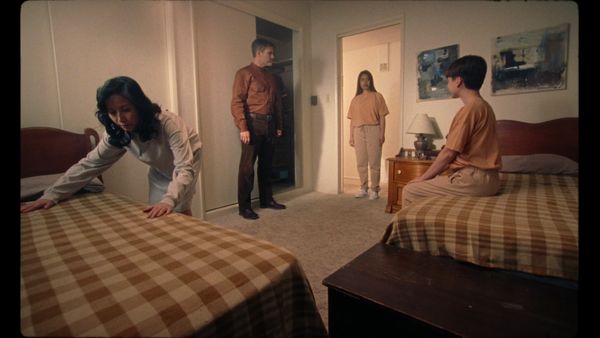 |
| Elyse Dinh, Casper Van Dien, Vivien Ngô and Ian Alexander in Daughter |
A small scale film which plays with established genre tropes to misdirect viewers en route to an ending which takes it in a very different direction, Daughter provides a platform for underserved Asian American actors and stars Caspar Van Dien in a role unlike anything he’s previously done. He plays a man known only as Father, who presides over a makeshift family of people he has kidnapped in a remote, fortified home. After an opening sequence which illustrates what happens when one of them tries to escape, we meet Daughter/Sister (Vivien Ngô), a young woman who must quickly make sense of her situation if she is to survive. Issues around control and subversion on domestic and societal scales play out in a drama informed by the work of Simone de Beauvoir as viewers, like the heroine, begin to question what’s real.
The film screened at Frightfest in 2022 and is now getting a digital release. Despite a very busy schedule, director Corey Deshon kindly managed to find time for a chat. We began at the beginning, discussing the positioning of a car on the skyline in a stunning shot which, I said, made me think of the science fiction classics of the Seventies. Was that what he was going for?
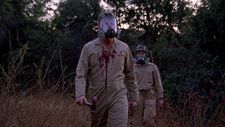 |
| Father and Son brave the outside world |
“Yeah, definitely,” he says. “There wasn't a particular movie, but definitely that time period, that feel and some of those openings. Even with the title design and stuff like that I wanted to, right off the bat, go with the idea that maybe this is a film that was made in that decade somewhere, just now being discovered.”
“The idea behind casting Casper Van Dien was to have an actor there who would be against type, who would be someone that an audience would have a certain preconceived notion of who they were, what kind of character they would play, who they would be on screen. And so for someone like him, who we associate with action hero stories, it's definitely playing on that. That idea that the audience is going to be surprised by what they see, that it's not going to be that kind of story.”
Since Starship Troopers he’s been cast so many times as versions of Johnny Rico that he must have been excited to be offered something else.
“Yeah, definitely. When he first got the script I remember him saying he really loved it. And I think he was really excited by the challenge of it, that it was something different for him, and he'd get to flex a different sort of muscle as an actor.”
For Corey, it was very important to create more opportunities for Asian American actors, who face a disproportionate struggle to find work, especially in leading roles.
“The casting idea, having Vivien and Ian (Alexander) and Elyse (Dinh) was something that was around from day one,” he says. “Vivien and I were having conversations about what we wanted to do in our careers, and she was feeling, as a Vietnamese actress, that she was in a similar place to where I was as a Black American director. The film industry is very limiting in terms of what they will allow us to do, what kind of work they want us to take on, what kind of projects they want us to make. And we were both at a place of wanting to be able to express who we were as artists in a way that would not be bound by those sorts of confines. And this project grew out of that.
“Thankfully, Ian and Elyse were already within this circle of friends. So even before I wrote the script, I was having conversations with them about what types of characters they might want to play, or what they were looking for in their careers that they hadn't had an opportunity to do yet, and I just wrote it. And it was this idea that we can allow these really great actors to stretch their muscles a little bit and flex and show the industry and, hopefully, anybody who's watching, that they are a lot more capable than the roles that they've been limited to.”
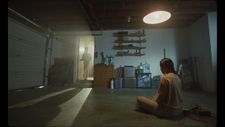 |
| Joining the family |
It sets up a very striking dynamic as well, with the three of them presided over by a white patriarch.
“Yeah, it's very much, I would say, a product of its time, even when I was making it. A product of Trump's America, people thinking about things, racial issues, and just wanting to use that to, poke and prod at the system a little bit.”
One of the things which i find most interesting in the film iis the relationship between Mother and Daughter, and the very different ways that they try to resist or to cope with what's happening to them. Was that a comment on the different styles of resistance that people use more generally, or was it focused primarily on the dramatics of those scenes?
“It was a little of both. I mean, I wanted each character within this little pocket universe to have a very unique perspective on how or what they believed their role in it was, or how they would use this system and operate through the system, and I wanted those to come into conflict with one another. Even two characters who are both being oppressed like this will have a different idea of what they're supposed to do in that scenario. And I wanted that to be a conflict between mother and daughter, that even though they both essentially want to escape and want to get out, and know this is wrong, they're not going to have the same idea about how they should go about doing that.
“I’m relying on the idea that the audience has seen the consequence already in the film, they know what's going to happen here if something doesn't go according to Father's plan. Daughter, well, she’s been told that and she might believe it. She hasn’t seen it, so she doesn't really know what the limit is and where the boundary is. And under this threat of violence, and what she feels to be a big physical threat against her, she realised that the best way forward for her is to try to outsmart the system and try to find a way to use its own rules against it and see what might happen there, just by, you know, poking and prodding, trying to find that boundary.
“Writing her character, I was trying not to have her become more classic, you know? That sort of role where she's fighting her way out. It doesn’t have to be physical or use violence, necessarily. I wanted this to be a cerebral type of character. She's trying to understand everything she can about the system so that she can beat it on its own terms.”
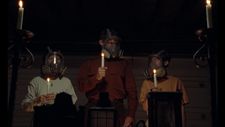 |
| Family together time |
Father’s unpredictability seems to be an important part of the way he keeps control – it’s a common tactic amongst abusers.
“Yeah. He's imposed such strict boundaries and it's all based on his mood in a way. There are times where he might respond violently and other times where he might laugh and go along with the joke. And it's all about that idea of keeping everybody under his thumb.”
II note that not only do daughter and mother have different ideas about how to cope with the situation and different notions of what it would mean to survive or escape, but father also has a different notion of what it means to be free. It seems to me that there are a lot of competing notions of freedom in the film.
He nods. “The basis of it, of the characters, was Simone de Beauvoir, and playing with these different character archetypes, which is outlined in the book, and basing some of the character personalities, like Father being the serious man, Mother being the sub man, maybe leaning a little nihilist, Brother as a child – and putting those types of characters in a situation and turning the heat on and seeing what happens. Everybody's followed under that sort of pressure when they start to become more extreme versions of themselves. What's going to happen? Are people going to just double down into their own beliefs and come out with stronger convictions? Or are they going to accept alternative viewpoints? But it is very much that idea that every single one of these characters is in their own reality, in a way their own subject. What's true for one character is not necessarily true for the other. How do people survive in a system like that? This thought experiment of what could happen to characters like that in this sort of situation.”
As the film progresses, we see more and more of the strange things that Father is doing in the house, never fully explained, and they make us begin to doubt our assumptions about what’s happening.
“There were two things that I wanted to play with. The idea that the longer that you are exposed like that, the more you might be like, ‘Is it true?’ Because it's that indoctrination, the same thing that he’s doing to his family. I wanted to see if there was a parallel that I could put the audience through that way and it was to have the stranger pieces of Father's reality start to manifest more. The other idea at work there was that we're stuck between all these different dualities that cause conflict and cause tension, and we have to accept in a lot of cases that it's not a binary choice, it's not one thing or the other thing. Sometimes it's both. And there is not going to be any simple reconciliation of that. So I wanted to play with that idea too, in the case of what Daughter/Sister is perceiving in the film, but also the audience. What if both of these things are true? What if Father is lying and he’s telling the truth? What could that look like in a film? And how can I have an audience feel that kind of disconnect and discomfort that Daughter would, as she's seeing more and more of what his reality is?”
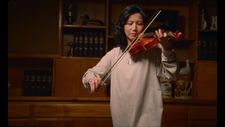 |
| Serving a purpose |
People often talk about cultural production as a means of fighting fascism, but still, the ending of the film is going to surprise a lot of people. Did he always see it developing that way?
“Yeah, I mean, that was in the script from day one, so I was really excited at the idea of what it was going to become, even not necessarily knowing how they're going to film it or anything like that. The central idea was to create this lens where you can look at the entire film as a metaphor for creative expression in these types of systems of oppression. And something that I’m fascinated by, that I wish I knew more about – I didn't study art or history – is the way these different art movements have popped up at different points in history – after World War Two, after all these things that change creative expression in people.
“It’s just really fascinating to me. It’s something that I think gets wiped out by fascist movements, everybody thinks the same way is the idea of that, no individual expression. And so what this was building to the entire time that I said was probably going to surprise people is that the thing that ultimately was the last straw is a super, super unique individual creative expression by Brother and Sister that's deemed inappropriate for this house.”
We discuss the film’s exceptional score.
“I would say 95% of what's heard in the film is all a sound created by our composer David Strother with an electric violin. I met him about a year before I started developing the film. I was at an art gallery here in LA. I was looking at work from a different artist I was working with on a different project, and as I walk into the gallery, I see David setting up with his violin and I’m like ‘Oh, cool, we're gonna have some live music. That's nice.’ And then about 20 minutes later, I recognised that the music had already started without me registering the start of it, and it just became the atmosphere in the gallery.
“It was this really unique sound unlike anything I've ever heard, and I grew up as a musician, I played piano, drums and saxophone. And I used to write and compose all kinds of stuff for years, so any kind of new, unique music is going to fascinate me. So I finally hear this, and it doesn't even register that this is the guy with the violin. I’m trying to find the source of the sound and here he is, David playing, just one guy, one violin and this array of guitar pedals that would shape and modulate and loop the sound and create this really wild soundscape with it. And this was before I even had any notion that Daughter was about to get made. It was ‘I need to work with you on something.
“We exchanged information, kept in touch, and by the time I was thinking of what could Daughter be, I already had David’s music in my head, like, okay, whatever it is i’m going to do, his sound is going to be the sound of it. When I start writing any feature or any film that I want to make, because I have a music background, I start the writing process that way too, knowing what I want the final film to sound like. Before I know what the story of it is, the sound, tone, and mood all comes from the emotion that music can evoke.
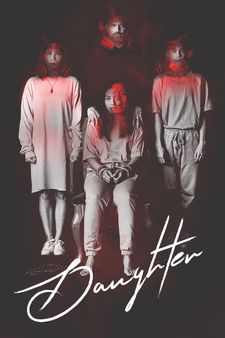 |
| Daughter poster |
“So David was the first crew member that was a part of the film. And what we would do is, once we shot everything, we would go to recording studios, the three of us – myself, David and our recording engineer, and we would just play a scene of the film. I'd give David a little bit of a direction, tone wise or mood wise, and he would just go off and improv something like that. It would became this living breathing organism of sound for the film. After we did a couple of those recording sessions, I would take the tracks back into the edit o0f the film and start to shape and mix and create what would be the score, and still try to retain his improvisational style. So as I was laying all the tracks on the edit itself, I would not allow the same piece of music to repeat more than once in the film. Even though there are recurring motifs, they will appear a little bit differently each time, so that no two pieces of music are exactly the same, trying to keep that living, breathing organism feel to it. My favourite parts of the film was working with David and putting the music together.”
The film is visually very distinctive. What was behind that?
“It was an idea of creating the look out of the lack of resources that we would have. Even doing the high contrast with the light, because we couldn't afford to light the entire space even if we wanted to. It was like, let's use that to our advantage and make some really high contrast. The house that we found was just perfect because it gave us so much – the wood fixtures and all that was all already there. So let's build into that. Even the camera movements – we had originally scheduled a 13 day shoot and it ended up being and about 11, 11 and a half. We lost a little bit of that time. But we were going on to that set knowing that we had to move very quickly, I wouldn't have time to just shoot, shoot and shoot, covering every angle from everywhere. We didn't have time to do that. So I had to be very minimalistic with the shot list.
“That informed doing a lot of stuff in wide, a lot of stuff in masters. I'm going to shoot one side, move it slightly this way in one shot if I want to change the angle a bit, but then we're not going to turn around and do the reverse because we don't have time on the day. So it was all about how do we be creative? How do we be unique and make a visual language that's unique to the film and fits the film in a way that also allows us to make the most out of what the limitations of our budget would be?
“Even the light leaks and stuff like that, none of that was added in post production. That was just what we shot, what it looked like. There were a couple of big scratches and flashes in the film image, and that was us running out of film and saying ‘Alright, that’s the cut!’ That's just about using what we had to become the visual language.”
Daughter is available of Digital Download now.





















